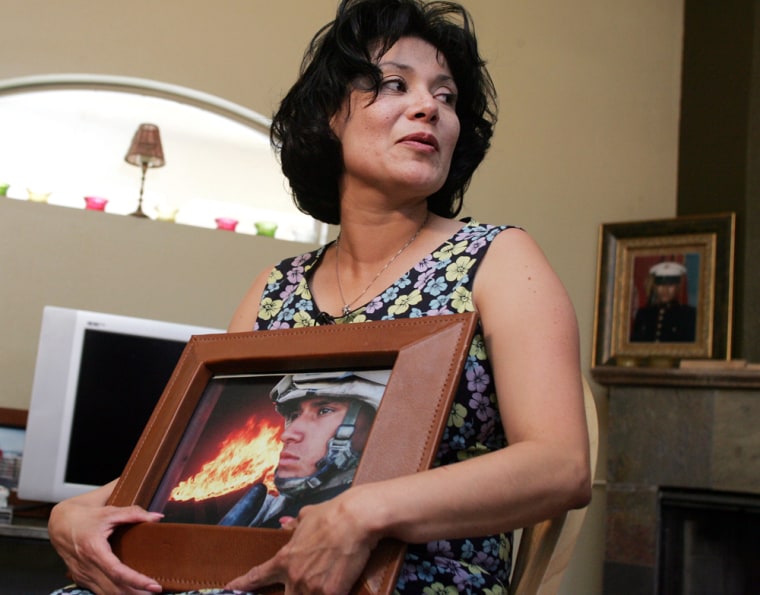Two Marines were severely traumatized after following orders to photograph corpses of unarmed Iraqi civilians that members of their unit are suspected of killing, their families said Monday.
The parents of Lance Cpl. Andrew Wright, 20, and Lance Cpl. Roel Ryan Briones, 21, both members of a Marine unit based at Camp Pendleton, said their sons were sent into the western Iraqi city of Haditha to help remove the bodies of as many as two dozen men, women and children who were shot.
While there, the two were ordered to photograph the scene with personal cameras they happened to be carrying the day of the attack, the families told The Associated Press in separate interviews. Briones’ mother, Susie, said her son told her mother he saw the bodies of 23 dead Iraqis that day.
“It was horrific. It was a terrible scene,” Susie Briones said in a tearful interview Monday at her home in California’s San Joaquin Valley.
Navy investigators confiscated Briones’ camera, his mother said. Wright’s parents, Patty and Frederick Wright of Novato, declined to comment on what might have happened to the photos their son took, but they said he had turned over all of his information to the Navy.
“He is the Forrest Gump of the military,” Frederick Wright said. “He ended up in the spotlight through no fault of his own.”
Ryan Briones told the Los Angeles Times that Navy investigators had interrogated him twice in Iraq and that they wanted to know whether bodies had been tampered with. He turned over his digital camera but did not know what happened to it after that.
‘Massacre’
Susie Briones called the Nov. 19 incident a “massacre” and said the military had done little to help her son, who goes by his middle name, deal with his post-traumatic stress disorder.
“I know Ryan is going through some major trauma right now,” said Susie Briones, 40, an academic adviser at a community college. “It was very traumatic for all of the soldiers involved with this thing.”
The details of what happened in Haditha are still murky. What is known is that a bomb rocked a military convoy and left one Marine dead. Marines then shot and killed unarmed civilians in a taxi at the scene and went into two homes and shot other people, according to Rep. John Murtha, a Pennsylvania Democrat and decorated war veteran who has been briefed by military officials.
The incident has sparked two investigations — one into the deadly encounter itself and another into whether it was the subject of a cover-up. The Marine Corps had initially attributed 15 civilian deaths to the car bombing and a firefight with insurgents, eight of whom the Marines reported had been killed.
Marine Gen. Peter Pace, chairman of the military’s Joint Chiefs of Staff, said Monday on CBS’s “The Early Show” that “it would be premature for me to judge” the situation.
But he added that it is critically important to make the point that if certain service members are responsible for an atrocity, they “have not performed their duty the way that 99.9 percent of their fellow Marines have.”
Asked how such a thing could have happened, Pace replied, “Fortunately, it does not happen very frequently, so there’s no way to say historically why something like this might have happened. We’ll find out.”
Briones’ best friend, Lance Cpl. Miguel “T.J.” Terrazas, had been killed the day of the attack by the roadside bomb, his mother said. He was still grieving when he was sent in to clean up the bodies of the Iraqi civilians.
Girl shot in head
One was a little girl who had been shot in the head, Susie Briones said.
“He had to carry that little girl’s body,” she said, “and her head was blown off and her brain splattered on his boots.”
The Wrights declined to say whether their son witnessed the killings or what he thought of the allegations against other members of his unit.
He was under so much pressure because of the investigation that he had consulted with an attorney, they said. He has also experienced psychological trauma.
Wright and Briones are both recipients of the Purple Heart, given to soldiers wounded in battle.
Wright was injured during an assault on Fallujah in January 2005. He voluntarily rejoined his unit at Camp Pendleton the next month.
Briones was on his second tour of duty in Iraq. He received a Purple Heart during his first tour.
On Monday, both Marines were back at Camp Pendleton, near Oceanside, where base officials said several members of Kilo Company, 3rd Battalion, 1st Marine Regiment, 1st Marine Division were being confined during the investigations.
Lt. Lawton King, a Camp Pendleton spokesman, declined to comment Monday, but another Marine there reflected on the damage the reports have done.
Nicholas Grey, a second lieutenant in the Marine Reserves based at Camp Pendleton, said the case will result in a loss of credibility for the Marines and increase Iraqi anger.
“It will make it a lot harder for the Marines who want to go through the streets,” he said.
